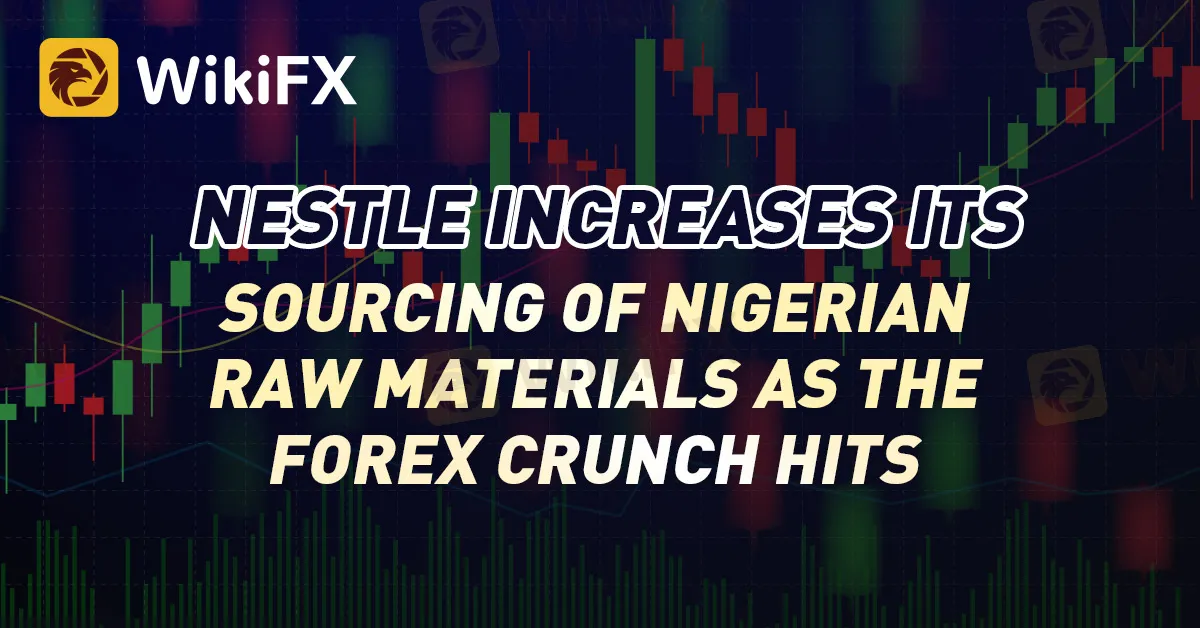简体中文
繁體中文
English
Pусский
日本語
ภาษาไทย
Tiếng Việt
Bahasa Indonesia
Español
हिन्दी
Filippiiniläinen
Français
Deutsch
Português
Türkçe
한국어
العربية
NESTLE INCREASES ITS SOURCING OF NIGERIAN RAW MATERIALS AS THE FOREX CRUNCH HITS
Abstract:Reuters, on June 26, in London: The companies of food giant Nestle (NESN.S) in Nigeria and other African nations are increasing their sourcing of indigenous raw materials like starch and turmeric, a move that could help lessen the sector's problematic vulnerability to foreign exchange.

· Nestle increases its sourcing from Nigeria and other African nations
· Nigeria allowed the naira to decline by as much as 36% last week.
· Nestle has provided letters of intent to nearby suppliers.
· provides financial assistance and technical help
Reuters, on June 26, in London: The companies of food giant Nestle (NESN.S) in Nigeria and other African nations are increasing their sourcing of indigenous raw materials like starch and turmeric, a move that could help lessen the sector's problematic vulnerability to foreign exchange.
Companies that manufacture consumer goods have increased their attempts to bring production and raw material sourcing closer to their target consumer markets in the wake of the COVID-19 outbreak and the supply chain issues it caused around the world.
The pressure on foreign reserves and the resulting currency instability in many African countries due to growing debt has made it increasingly difficult and expensive to buy inputs. For example, Nigeria's central bank permitted the naira to decline by as much as 36% on the official market last week.
Cassava starch will replace imported maize starch in Nigeria, according to Nestle, which told Reuters it had assisted seven local suppliers in expanding output to meet demand.
“(The) next step is to expand the localization journey across the region: Cote d'Ivoire, Cameroon, and Senegal,” the
In response to inquiries, the largest manufacturer of packaged foods in the world said in an email statement.
More than 2,000 products, including Maggi stock cubes and Nesquik milkshakes, are produced by the Swiss firm that also produces Nescafe coffee and Kit Kat candy bars.
POWDERED ONION AND TURMERIC
According to Nestle, it is attempting to establish local vendors for the vegetables and spices used in Maggi products, such as turmeric powder in Nigeria and Senegal and onion powder in Nigeria.
In the grain sector, we have effectively established local farmers and processors; this has been made possible by (a lot of) training in appropriate farming methods, harvesting, warehousing, and cleaning practices.
“As part of our journey and commitment to sustainability, we are now taking this next step to introduce these farmers to regenerative agriculture.”
Protecting and rebuilding soil health is a common component of regenerative agriculture, which in turn aids in capturing more carbon from the atmosphere to lower greenhouse gas emissions.
According to Nestle, it has occasionally supplied letters of intent, technical know-how, collaborated with regional authorities to establish standards, and financial support through advance payments to suppliers to address working capital issues.
Unilever, a competitor of Nestle, said last month that managing foreign exchange costs is essentially what is motivating its own shift from Asian suppliers to African ones, even though sourcing from the continent can be more expensive than doing so in some regions of Asia.
Nestle did not address whether its location in Nigeria would protect it from fluctuations in foreign exchange rates, nor did it provide information on the economic significance of the local sourcing.
The Middle East and Africa region's sales for Nestle increased by roughly 6% last year to 5.25 billion Swiss francs ($5.9 billion), or about 6% of the whole group's annual sales of 94.4 billion francs.

Disclaimer:
The views in this article only represent the author's personal views, and do not constitute investment advice on this platform. This platform does not guarantee the accuracy, completeness and timeliness of the information in the article, and will not be liable for any loss caused by the use of or reliance on the information in the article.
Read more

What Impact on Investors as Oil Prices Decline?
Oil prices have come under pressure amid mounting concerns over U.S. import tariffs and rising output from OPEC+ producers. With tariffs on key trading partners and supply increases dampening fuel demand expectations, investor appetite for riskier assets has cooled. This shift in sentiment poses a range of implications for different segments of the investment landscape.

Teacher Lost Life Savings in WhatsApp Investment Fraud
A Malaysian teacher recently became the victim of an elaborate investment scam, losing more than RM200,000 after being lured into a fraudulent Bitcoin scheme through WhatsApp.

Unmasking a RM24 Million Forex Scam in Malaysia
Authorities in Malaysia have identified the prime suspect behind a foreign exchange (forex) investment fraud that has caused losses exceeding RM24 million.

How to Choose the Best Forex Pairs? Avoid Common Trading Pitfalls
Choosing the right forex pair is crucial for success. This guide explores volatility, trading sessions, and costs to help traders make informed decisions and maximize profitability.
WikiFX Broker
Latest News
Forex Trading: Scam or Real Opportunity?
The Hidden Tactics Brokers Use to Block Your Withdrawals
Beware: Online Share Buying Scam Costs 2,791,780 PHP in Losses
5 things I wish someone could have told me before I chose a forex broker
Unmasking a RM24 Million Forex Scam in Malaysia
U.S., Germany, and Finland Shut Down Garantex Over Money Laundering Allegations
Gold Prices Fluctuate: What Really Determines Their Value?
Dollar Under Fire—Is More Decline Ahead?
What Impact on Investors as Oil Prices Decline?
Is the North Korea's Lazarus Group the Biggest Crypto Hackers or Scapegoats?
Currency Calculator






